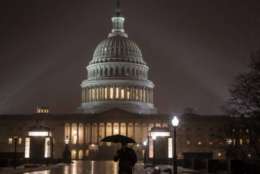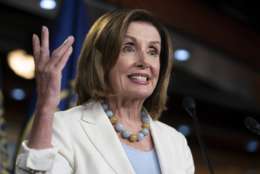Government Shutdown
-
In today's Federal Newscast, the Equal Employment Opportunity Commission will host free online training on the agency's new online filing system for federal sector complaints and appeals.
August 20, 2019 -
By now there have been plenty of stories about the hardships the longest government shutdown in history created for the federal workforce. But new research from Weber State University is among the first to try to quantify the impacts.
August 07, 2019 -
In order to avoid a government shutdown, Congress still needs to agree on the nitty gritty details of the 2020 appropriations bills.
August 06, 2019 -
The 2019 Bipartisan Budget Act sets defense and non-defense spending limits for the next two years, but much of the real work remains when Congress returns from August recess.
August 02, 2019 -
GAO is taking a closer look at whether some of the efforts agencies took during the last shutdown meet the criteria for very narrow exceptions under the Antideficiency Act.
August 01, 2019 -
The idea that the recent budget agreement between House and Senate leaders and President Trump guarantees there will be no shutdown is wrong.
July 31, 2019 -
Republican and Democratic congressional leaders and President Donald Trump endorse a debt and budget agreement that fends off concerns over a possible government shutdown or a federal default
July 23, 2019 -
In today's Federal Newscast, the Office of Personnel Management is urging agencies to consider telework and workplace flexibilities during this week's heat wave.
July 18, 2019 -
The main sticking point between the House and Senate versions is the topline number. The Senate bill authorizes an additional $17 billion for the Defense Department, which the House argues would be used for pet projects like the border wall.
July 15, 2019 -
Some see federal employment as a protected world of benefits, protections, a great place to retire from, etc. But the reality is sometimes very different.
July 11, 2019 -
Things are looking good. but the possibility of yet another government shutdown remains, as today's guest columnist Abraham Grungold points out.
July 09, 2019 -
An appeals court has upheld a freeze on Pentagon money to build a border wall with Mexico, casting doubt on President Donald Trump's ability to make good on a signature campaign promise before the 2020 election
July 04, 2019 -
A House-passed minibus of five appropriations bills includes back pay for low wage contractors impacted by this year's government shutdown.
June 26, 2019 -
In the old days, Summer meant Congress was moving on appropriations bills that would be on the President’s desk by October. In 2019, that is more of a fairy tale.
June 25, 2019 -
The Trump administration said back pay for contractors affected by the shutdown will be too costly and increase the risk of fraud, waste, and improper payments.
June 19, 2019















